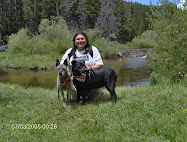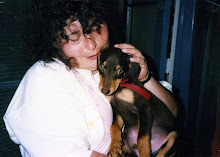Dedication to our co-author, colleague and friend ...
by Francisco Rios, Caskey Russell and Jacquelyn Bridgeman in Critical Race Theory Matters: Education and Ideology, Routledge, 2010
This book is dedicated to the memory of our colleague and friend, Dr. Margie Zamudio. Dr. Margie Zamudio was the driving force behind this book: she first proposed it to the publisher and then she proposed it to us. She organized the meetings where we discussed the focus and organization of the book, she was the person who collected the parts we wrote, she provided commentary and recommendations for improvement. She had final editing approval for the contents of the book and was the person who worked most closely with the publisher.
We were working on the final revisions for this manuscript when, on Christmas day, 2009, Margie Zamudio died in a freak accident outside of her home. With her sister Josefina at our side, we spread the ashes of her two dogs—Chewee and Fidel— along with her own in the mountains outside of Laramie, the place she loved to walk, to bike, and to cross-country ski. She leaves behind her dog Harley and many, many people who call her friend, softball player, scholar, teacher, activist, collaborator, and writer.
***
Margie Zamudio was born in Los Angeles, California where she grew up. After a troubled childhood, she found her way to UCLA as a recipient of a college preparation program. She not only completed her Bachelor’s degree, but she also completed her Master’s and Doctoral Degree in sociology, the latter in 1996.
She held a position in sociology at the University of Colorado – Boulder from 1996-2002. In 2002 she accepted a position in Chicano Studies and Sociology at the University of Wyoming. In 2009, she received tenure and promotion to Associate professor. She taught courses for Women’s Studies, Chicano Studies, and Sociology.
Her academic interests focused on labor relations (particularly for black and Latino laborers), immigration issues, racism and racialization, and women of color in the US. She had an emerging interest in the sociology of education. In the last few years, she took an active interest in Critical Race Theory, and had attended the LatCrit conference for the last several years.
***
Margie was an incredible critical friend. Given her ethic of critical thinking, she pushed, cajoled, critiqued, challenged, and at the same time affirmed her students, colleagues, and friends. She was the kind of person you definitely wanted on your side in a fight and she was as loyal a friend as any could find. She was a great colleague to collaborate with because you knew that she would offer suggestions and critique that would make the work stronger. She also was a very a good writer in her own right. And, as an organic intellectual, she sought to bring her activism and her academics together in ways that few are able to do and succeed.
In her office at home Margie kept a pair of boxing gloves signed by Muhammad Ali. Like Ali, Margie was a fearless, often vocal, fighter for issues of social justice and civil rights. And, like Ali, Margie had a wonderful capacity for humor and compassion. Margie’s fighting spirit came from her immense feeling of humanity and her indignation against injustice—especially injustice done to marginalized people.
Margie the scholar, the intellectual, the activist, the mentor, the caring, compassionate and supportive friend never forgot where she came from. She never quit fighting for social justice. She never quit pushing herself and others to remain critical and to continue to work to dismantle the systems of privilege and hierarchy that continue to marginalize, subordinate, and oppress so many. It is our hope that in finishing this book, which was so important to her, that we will help others acquire the tools necessary to pursue social justice and equality, particularly within the field of education.
We hope that this book provides you, dear readers, with a small insight into the kind of person—friend, colleague, and scholar—that Margie was. While she had several book ideas, this is her first book. We lament that it is also her last. We offer this book as a testament to her legacy, the person she was and the kind of work that she accomplished. We will miss her.
Where is Harley?
 To all who have been asking about Harley. . . she has been adopted by Margie's close friend and colleague, Angela Jaime, and her pack of two rambunctious boys, two dogs, and a grandmother.
To all who have been asking about Harley. . . she has been adopted by Margie's close friend and colleague, Angela Jaime, and her pack of two rambunctious boys, two dogs, and a grandmother. Harley has adjusted well to her very lively new home, has lost ten pounds, is vying to be top dog, and is an incredibly happy pup. This would have meant the world to Margie.
El Salvador, December 2009
No social study that does not come back to the problems of biography,
of history and of their intersections within a society,
has completed its intellectual journey. – C. Wright Mills
In early December Margie took her very first trip to El Salvador to embark on a research project that would examine the economic forces behind the pre-1970s migration of Salvadorean women to the U.S. In her research proposal, “Gendered Migration from El Salvador”, Margie writes:
The intersection of socio-historical structures in the lives of individuals today speaks to a notion of historical "ghosts" that continue to pattern the lives of individuals. In our rapidly changing globalizing existence, there is much talk about the "end of history", that the general social processes that dominated our historical development during the period of industrial capitalism no longer has a hold on us. This research project challenges this notion.
The intersection of socio-historical structures in the lives of individuals today speaks to a notion of historical "ghosts" that continue to pattern the lives of individuals. In our rapidly changing globalizing existence, there is much talk about the "end of history", that the general social processes that dominated our historical development during the period of industrial capitalism no longer has a hold on us. This research project challenges this notion.
Doctoral graduation 1997
Several days before hearing about Margie's death, I received her very playful and happy Christmas card. Dog lover that she was, her very lively card portrayed a red and green dog with Santa caps sitting among colorful, fanciful Xmas trees and snowflakes. Margie's words were both thankful for past support and focused on her future: "Hi John, Always thinking of you. Best wishes for the upcoming year., Love Margie. P.S. I was just in El Salvador, thinking about new research there." She enclosed a card from La Libertad, El Salvador.
I chaired Margie's doctoral committee at UCLA, followed the ups and downs of her career, and cried when I heard about her unbelievable end. I loved that crazy, brilliant woman. - John Horton
Margie's UCLA community
Margie's untimely passing is a tragic loss--how many Latinas make it through the challenges that she faced? Her life story would make a wonderful and inspiring book, and many who didn't know her would find it difficult to believe it was all true. I read her articles on racism in the academy and look forward to her book which will be a significant contribution. I will always remember her as a tough (in an compelling way), witty, down to earth home girl who was one of the few who fought hard to get where she was. - Mary Pardo
While our paths in grad school did not cross (I left by the time Margie arrived), I recall with much admiration with which she fought hard and bravely for her position at U of C Boulder and the rebuilding of her life at Laramie. Margie was and remains a warrior.
- In solidarity, Marta Lopez-GarzaThis is devastating -- and I am deeply sad at this loss. I recently had a conversation at ASA with one of her Latino colleagues and he was excited about how well she was doing. I had communicated with Margie last year when we were trying to work out dates when we could meet and discuss participatory research strategies. I new that she was coming out with a book -- and I know that she had finally found her niche. She is an example of someone who fought every step of the way to open the doors of academia. I have a hard time finding the words to describe her. Your words, John, are the best. She was a "crazy, brilliant woman" that, though far away, meant so much to all of us who knew her. - Jose Zapata Calderon
The soul of the Little League team...and her Laramie softball team.
Margie as a teammate and captain was always a fun experience. Margie had a passion for competition that translated onto the softball field. While she knew the point of slow pitch softball was to win she knew it was more important to have fun, and that losing a softball game was not the end of the world.
I have been playing softball in Laramie since I moved back in 2001. I played both men’s league and coed softball with great enjoyment. I enjoy getting out side, running around the field and generally having a good time doing it. Razing my teammates for both good plays, and bad, I have learned that softball is all about having fun, being outside with your friends, enjoying a few drinks before the game or after, or both. It is all about who you play with and how much you enjoy it and your teammates. I have always had good teammates and am lucky in that sense.
Three years ago our coed team was struggling to put together a roster big enough to field a team, and Margie’s team was having the same problem. Somehow, our captain, a strapping slugger of an outfielder, short stop, first baseman, drinker of beers, and thrower of parties, got connected with Margie and they decided to combine the two teams. There could not have been a better match of teams; both enjoyed just
playing the game, the camaraderie between teammates and the general fun of spending an evening playing a game outside rather than watching TV. Rowdy is a great captain and teammate but very soon Margie’s personality and enthusiasm started taking over the team and happily Rowdy handed off the reigns of team captain to her. She guided our team to some pretty good records while worrying about hurt feelings over playing time, and her own, sometimes, inconsistent bat. But with Margie, no one cared about playing time, we all just enjoyed playing, enjoyed the email reminders she would send via email and the mandatory team meetings at the Library.
Margie would be hard on herself for her performance on the field and we all liked to kid her about her eyes lighting up at the high deep pitches and how she often stopped more throws at first base with her shins than her glove. Margie was easy to kid around with, to raze her about her speed when she would “coast” into second base with a double, and she enjoyed giving it all right back to us.
I loved playing softball with Margie and there will be a hole in our line-up and hearts as we take the field this summer to play. But play we will, in honor of our captain. - David Willems
Posted by
jz
Subscribe to:
Comments (Atom)


















